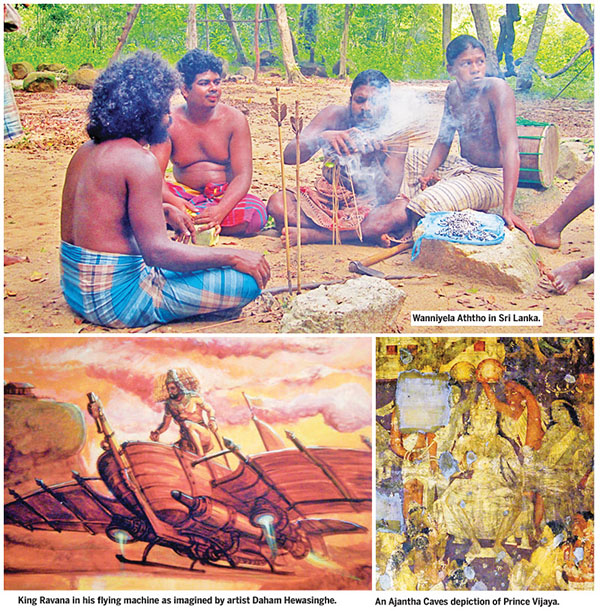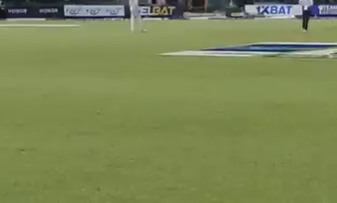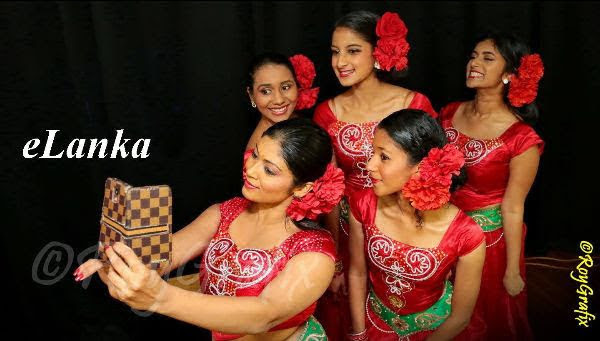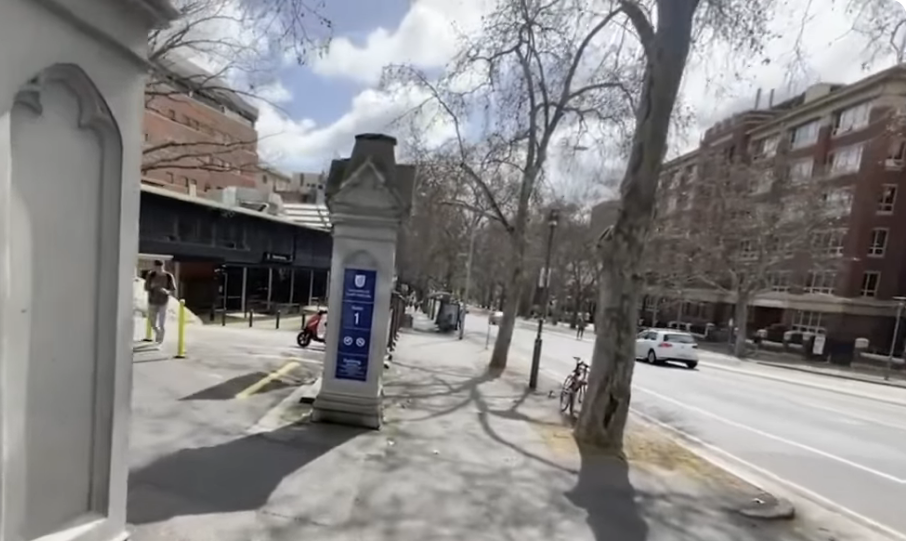We were here before the arrival of Vijaya-Nadira Gunatilleke
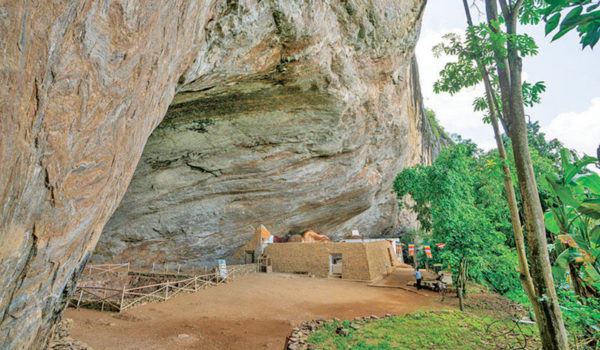
Source:Daily News
The Fa Hien Caves, where humans had lived more than 45,000 years ago.
Individuals and groups make various statements to support their claims to land, but very few can provide real proof of their arguments. They have no historical evidence to prove their right to a land. We are talking about the indigenous people of Sri Lanka, the real owners of this land and the real identity of the Sinhalese who have been living in Sri Lanka long before Vijaya arrived from India. Therefore, it is amusing to note how some politicians from a certain part of Sri Lanka describe certain names and places as a heritage of their ethnicity and culture.
Several different indigenous clans lived in Sri Lanka during the pre-Vijaya era (before 505 BCE). These clans are mentioned in the great epics, the Mahabaratha, Mahavamsa, Manimekalai, Ramayana and Sangam. It is believed that four main clans lived in Sri Lanka before Vijaya landed in the island. These four clans are the Yaksha, Naga, Deva, and Raksha (Rakus).
It is believed that these names were attributed metaphorically to indicate their profession: Yakshas were believed to inhabit the mountains where they had used monsoon wind to mould iron.
Rakshas were supposed to be farmers who used the steel products of the Yaksha people in their farming endeavours (the name Raksha is derived from the two syllables ra+kus. In Sinhala, kus means stomach; rakus literally means the people who fulfill hunger or the people who provide rice, the staple food of the Sinhalese.
The Naga people were believed to be traders, while the Deva people were the rulers, the people who used to be the link between the Raksha people and Yaksha people. The Nagas were serpent-worshippers and the Yaksha culture worshipped spirits.
Even today, Sri Lankan culture has some elements that originated from the culture of the Yakshas and Nagas. The majority of the native population were farmers and cattle herders. They had knowledge about the healing arts (Ayurvedic), built irrigation systems and temples. There were hospitals and quarantine centres in Sri Lanka by that time.
The era before the arrival of Vijaya was not well documented, so there is not much known of the previous native rulers of Sri Lanka. Ravana, the King of Lanka, is considered the most famous and most powerful native king who ever reigned in Sri Lanka. The native rulers of Sri Lanka were later supplanted by the Indian rulers who came and invaded Sri Lanka from Kalinga and South India. But very clearly, it was King Ravana who ruled Sri Lanka before the arrival of the Indians.
The Veddha community comprises indigenous people still living in Sri Lanka. The Veddah minority in Sri Lanka faces the threat of becoming completely assimilated. Most speak Sinhala instead of their indigenous language which is nearing extinction. It has been revealed that the Veddahs were probably the earliest inhabitants of Sri Lanka and have lived on the island before the arrival of other ethnic groups from India. The Ratnapura district, which is part of the Sabaragamuwa Province, is known to have been inhabited by the Veddahs in the distant past. This has been proven by scholars. The very name ‘Sabaragamuwa’ is believed to have meant the ‘village of the Sabaras’ or ‘forest barbarians’. Place names such as Vedda-Gala (Vedda Rock), Vedda-Ela (Vedda Canal) and Vedi-Kanda (Vedda Mountain) in the Ratnapura district also bear testimony to this.
Most of the races in the world have their own country with historical evidence to prove that they lived in that specific country before the arrival of others. This historical evidence matters when it comes to claiming the sovereignty of a country. The historical evidence is contained in physical places, objects and so on. But some ethnic groups which do not have a country or scientific evidence to present to claim for a land, use other tactics to achieve their targets.
They expel the real owners of the countries or divide countries and get the ownership of one part. In most cases such as Palestine, the group which gets the ownership of a part of the original (single) country chases away the people who lived in that country from the beginning and capture the entire country making the real and true owners of the country a group of refugees.
Unfortunately, there are international organizations and non-governmental organizations (NGOs) which use such instances to make money and expand their power in the world. Some countries need conflicts and civil wars to sell their arms. Therefore, they promote hatred between ethnic communities living in one country and encourage one ethnic community to fight and divide the country. Then the two separated parts of the country enter into a prolonged war, which needs regular supply of arms.
The Palestinian people were not refugees in history. They lived in their own land. But when World War I ended in 1918, the British took control of Palestine. The League of Nations issued a British mandate for Palestine, a document that gave Britain the responsibility of establishing a Jewish national homeland in Palestine which went into effect in 1923.
In 1947, the United Nations proposed a plan to partition Palestine into two sections: an independent Jewish state and an independent Arab state, with Jerusalem as an internationalized territory. Since the partition, gradually the people of Palestine were pushed into the Gaza strip. This is what really happened in history which many do not know or pretend they do not know.
What should actually be done is to enable whoever does not have a country to stay in another country with basic rights. But the minority should not be allowed to rule the majority, which will always end up violating the rights of the majority with efforts being made to make the majority the minority.
It is the indigenous people who own this world in addition to the birds and animals. Therefore, we need to respect them and ensure their rights. We do not need to protect them if we respect and treat them as human beings just like us. We should stop making money by using them. We need to stop grabbing their resources. But even after COVID-19, it seems that people have not learned a lesson and are leading their usual destructive lifestyle, destroying the natural world. It will be too late when they learn the real and final lesson.
